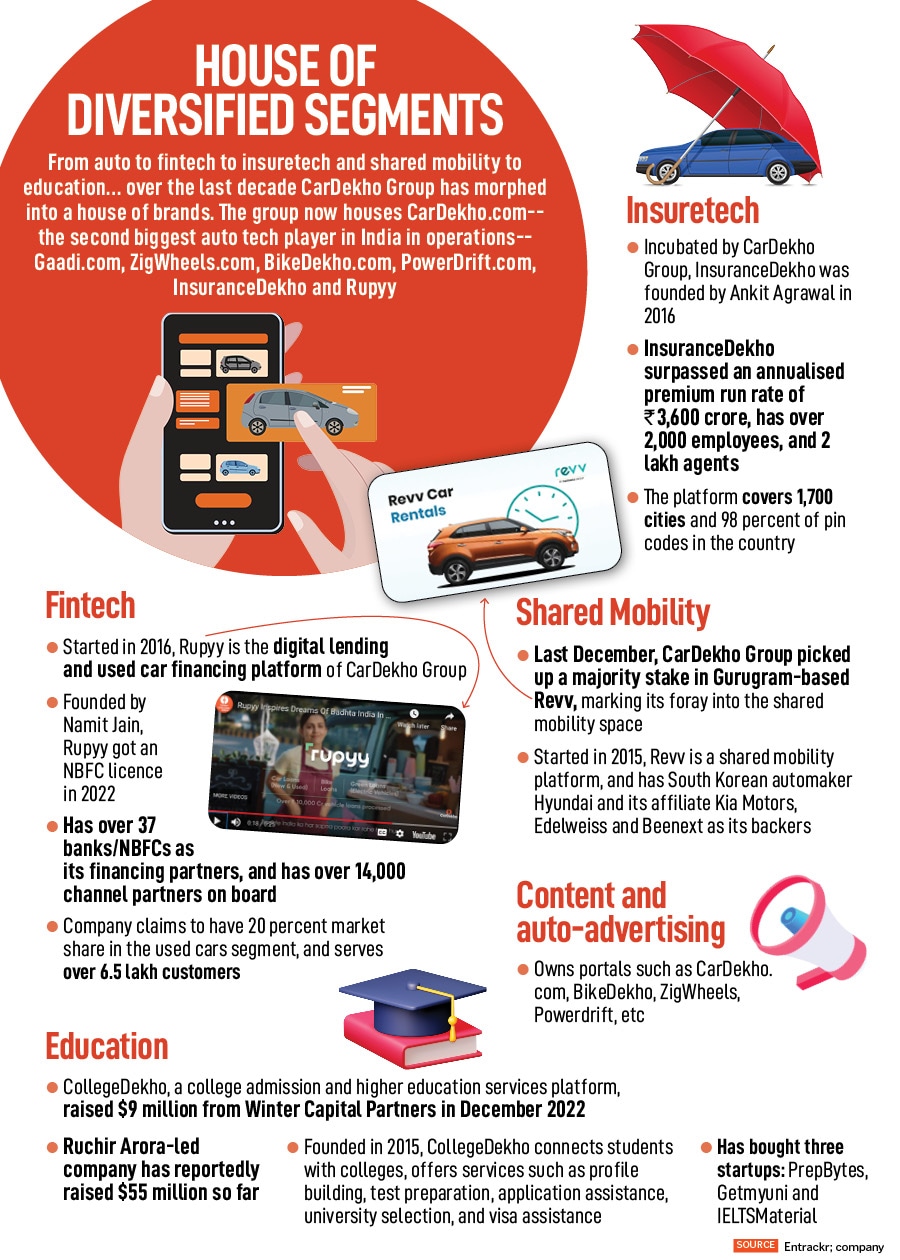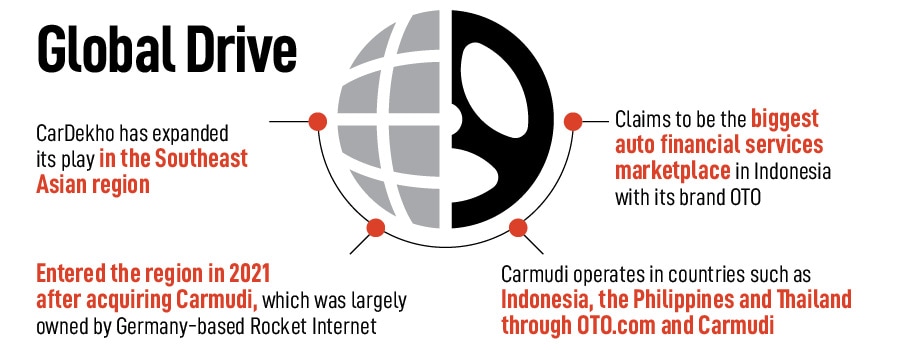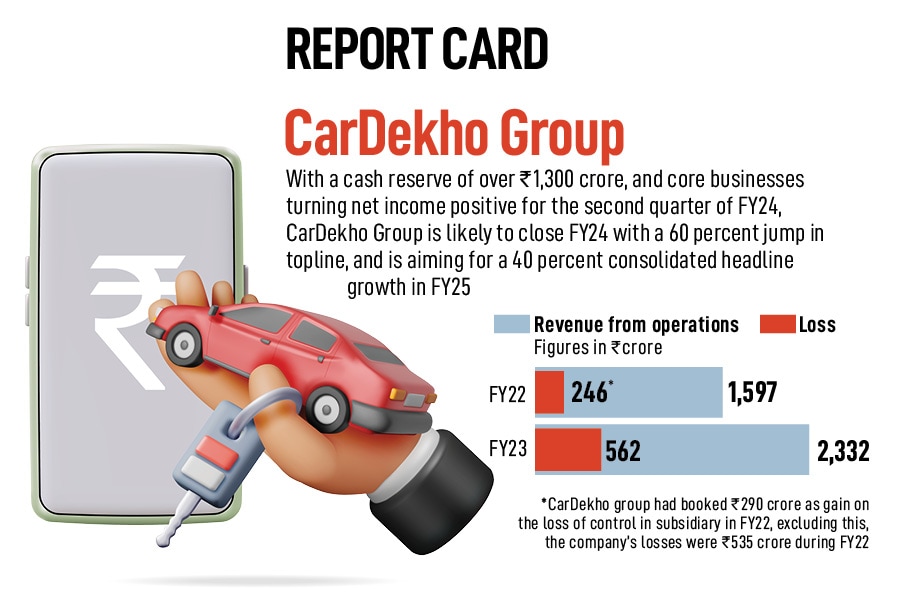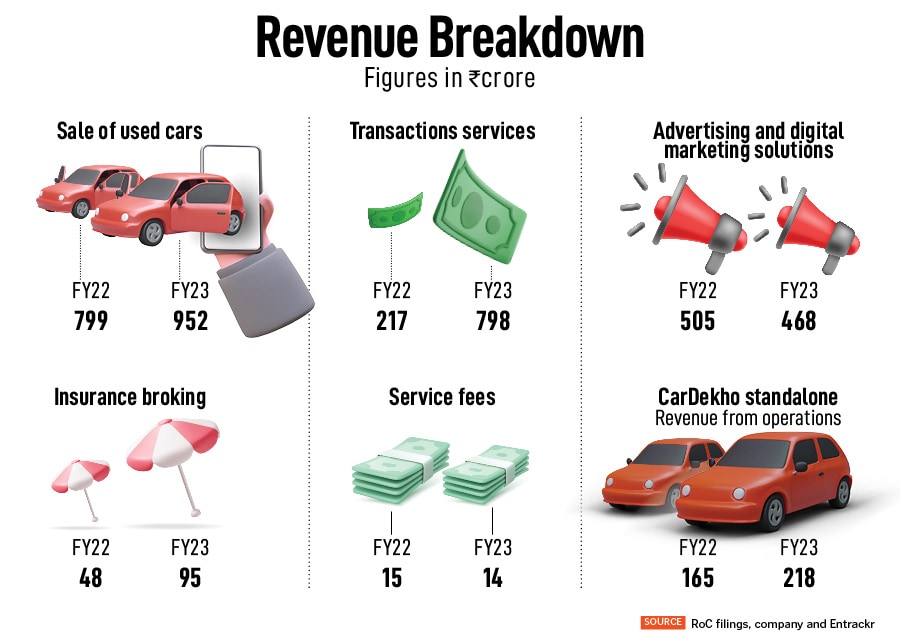CarDekho: An IPO drive from Jaipur
From starting CarDekho in Jaipur in 2008 to entering global markets and building multiple brands to making a transition to a 'House of Founders', Amit and Anurag Jain have crafted their long journey i


There is an uncanny and humourous connection between American Will Rogers and the Indian stock market. “There are three kinds of men," the celebrated writer, actor, cowboy philosopher, and political commentator once reckoned, alluding to how people learn. The first set learns by reading. Then there are a few who learn by observation. “The rest of them (the third kind) have to pee on the electric fence and find out for themselves," underlined Rogers, whose weekly half-hour live Sunday evening radio programme—The Good Gulf Show—captivated Americans in the 30s.
Meanwhile in India, Rogers’ ‘three kinds of men’ theory makes perfect sense in a different context. Sample this. There are three kinds of founders when it comes to the way they prepare for IPOs and a public listing. The first kind is a stickler for tradition. They go by the established playbook of building a sustainable company for years, most of them get listed after decades, and the rest, after a decade.
The second kind learns by observation. They are the ones who stay away from the trap by looking for what went wrong, what clicked, and what must be shunned. And the last kind of founders are mavericks—much like the new-age startup cowboy entrepreneurs—who try to impress the market with their topline growth and the paraphernalia around their unicorn status. The idea is to plaster the heavy loss side of the narrative, depict the rosy picture of growth, and sell the fairytale story to retail investors. Unfortunately, much to their chagrin, they eventually discover that they are outsmarted by the public market, which backs sustainable and profitable growth stories.

Meanwhile, in Jaipur, the Jain brothers—Amit and Anurag—are learning via observation. “There"s been a lot of learning from the debacle of a bunch of tech companies in the way they got listed on the public market," reckons Amit, who co-founded CarDekho along with his brother Anurag from a garage in 2008. “What we"ve picked from their playbook," chips in Anurag with his insight, “is that taking a company public makes sense only when it is profitable." Amit augments the profitability theory by adding one more layer. “We will go IPO only once we have at least four to six trailing quarters of profitability," says the chief executive officer of the auto tech company, which started in Jaipur, and over the next one-and-a-half decades morphed and diversified into a house of brands such as CarDekho—the second biggest auto tech player in India in operations, Gaadi.com, ZigWheels.com, BikeDekho.com, PowerDrift.com, InsuranceDekho, and Rupyy.
Over 15 years into the journey, the unicorn has hit the road to IPO. The planning, interestingly, is inspired by a lot of takeaways from a clutch of IPOs of the new-age tech companies that hit the public market over the last four years. Apart from consistent quarters of profit, there is another prerequisite that the brothers have imposed upon themselves. “One must go to the market with a credible story rather than an incredible one," reckons Amit.

The core businesses, claims Amit, turned net income positive for the second quarter of FY24, and the CarDekho Group is likely to close FY24 with a 60 percent jump in topline. “We are aiming for a 40 percent consolidated headline growth in FY25," he says, sharing another learning for an IPO. “One must go public at the right valuation," he says. For the unicorn founder—CarDekho entered the $1 billion valuation club when it raised $250 million in a Series E round of funding in 2021—a sharp focus on the right valuation and over-pricing makes sense given the disastrous public market debut of Paytm in 2021.

The stock of the fintech major, which once had a peak private valuation of $16 billion, got listed at BSE at Rs 1,950, a 9 percent discount to its IPO price of Rs 2,150. On the first day, it plunged 27 percent, and closed at Rs 1,564.15, which made Paytm one of the worst listing-day performances of IPOs above Rs 1,000 crore. Industry observers and market experts blamed the over-priced IPO and valuation of the loss-making firm. “One must not overprice the IPO," says Amit, listing his yet another learning that has come from observation.
Okay, over-pricing by a founder is a sin, and over-valuation might be a blunder but what about the retail investors? Are they not conservative in valuing the new-age tech companies by viewing them largely through the traditional lens of profit? Amit reckons the investors in the public market have their own set of reasons to stick to a tried and tested approach. “The Indian investors have evolved," he says, adding that tech companies had valuations much ahead of time. What has played out in the stock market over the last few months, he underlines, is a balancing and an evolutionary act.

Take, for instance, PolicyBazaar and Zomato. Both were loss-making, both had their share of drubbing by the public market, but the companies firmly stayed on the road to profitability. “The market has seen how they have evolved and performed," says Amit. On the other hand, founders have realised that they can’t ask for a forward-looking valuation or a valuation that is much ahead of time and based on future promises. Another realisation stems from the difference in the DNA of a public and private market. While growth at all costs might be appreciated in private markets, the public market shuns such a mindset and philosophy. “It has to be sustainable growth," says Amit.
America too, reckons Anurag, had a period where investors and new-age companies got to know each other in a better way. “India is now in a similar phase," he says, adding that over a decade, Indian investors might start welcoming and appreciating loss-making companies too in a much better way. “I won’t be surprised if this happens," he says, adding that the performance of a bunch of new-age companies—which includes the likes of Nykaa, Mamaearth, Zomato, and PolicyBazaar—over the next few years will go on to instill more confidence among the investors.

What, though, gives the Jain brothers ample confidence about their public market debut is that CarDekho is no longer about cars alone. From auto to fintech to insuretech and shared mobility to education, CarDekho has morphed into a group housing a clutch of brands that have been charting independent journeys under the parent umbrella over the last decade (see box). “We are inspired by the journey and trajectory of Amazon," says Amit, underlining the power of compounding and adding more engines of growth.
Take, for instance, InsuranceDekho. Incubated by CarDekho Group, the insuretech company was founded by Ankit Agrawal in 2016, has surpassed an annualised premium run rate of Rs 3,600 crore, has over 2,000 employees and 2 lakh agents. The platform covers over 1,700 cities and 98 percent of pin codes in the country. Then there is fintech play in Rupyy. Started in 2016, Rupyy is the digital lending and used car financing platform of CarDekho Group. Founded by Namit Jain, Rupyy got an NBFC license in 2022, has over 37 banks/NBFCs as its financing partners, and has onboarded over 14,000 channel partners. The company claims to have a 20 percent market share in the used cars segment and serves over 6.5 lakh customers.

If insurance and finance are in sync with the core business of the group, then the play in education adds another dimension. Ruchir Arora-led CollegeDekho, a college admission and higher education services platform, raised $9 million from Winter Capital Partners in December 2022, and has reportedly raised $55 million so far. “CarDekho’s foreign innings has also been shaping up quite well," claims Anurag, adding that the company entered the Southeast Asian region in 2021 by acquiring Carmudi, which operates in countries such as Indonesia, the Philippines, and Thailand. “So, there are multiple engines of growth and multiple founders under the group," says Amit, adding that the brothers are building an ecosystem where multiple businesses will collectively command a $100 billion valuation over the next decade.
Industry observers and venture capitalists are excited to see the growth trajectory of a company that is still headquartered out of Jaipur. “It has been a slow, steady, and heady growth," reckons Anil Joshi, founder of Unicorn India Ventures. The brothers, he underlines, have proved naysayers wrong by building an empire out of a small town. “Staying bootstrapped for the first six-seven years ingrained the frugal DNA in the organisation, and it remains so even after loads of VC funding," he adds. The challenge, though, now would be to post and sustain quarters and years of profitable growth. The fact that there are multiple founders adds heft to the story of the group, the complexity that a diverse set of founders and companies bring under the parent umbrella is something that needs to be seen in how it plays out. “They also need to be more cautious about costly mistakes," he says, alluding to the shutting down of the used car retail business in May 2023.

Amit explains what went wrong. For over two and a half years, the company posted losses. Though the opportunity was massive, the brothers failed to notice the red flags: High burn on parking, showrooms, and manpower. The company invested around $20-25 million, and at the peak of the venture, it sold around 800 cars. “We pulled the plug as it became clear that it will never make money," he says. “It was a costly learning for us," he says, adding that the group has seen multiple failures over the last decade. What, though, has helped the brothers in containing the damage has been the speed at which they pull the plug. ‘We pulled back in time," he says with a smile.
First Published: Apr 05, 2024, 16:30
Subscribe Now